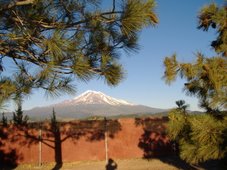Of all the old traditions that have slipped away due to email, text, instant message, plus the changes in society where there are no societal penalties for lying; the one thing I most miss is conversation.
I do not see people sitting and talking, with or without alcohol. Just plain conversing, sharing ideas, opinions, and perspectives on the world. The young in bars seem to NED loud music so that talk is hard and barest communications must be shouted... Houses lack front porch to sit and observe the passing parade... Living rooms are dominated by flickering bhttp://www.blogger.com/img/blank.giflue lights and sound systems, combined which cost more than the vehicle in the driveway... A visit to the home of a friend is often done with the TV going. I'm old. I cannot focus my complete attention on two things at a time. I give my priority to the person, live, and present.
Funny thing is, when I mute the TV or turn it off, the person stops talking. They seem to feel they are interfering somehow... yet, what they do not -get- is that I value their presence and words more than the babbling heads or silly drama/comedies that are selling me products.
I am presently reading "Robert Frost The Poet as Philosopher" by Peter Stanlis.
Robert Frost felt he could not be a true poet until he found his conversational voice. He paid attention to what people say, how they said it and what they meant. English is a growing, broad and inclusive language. We have many words. we can use them in a wide variety of ways
Prosody is a very interesting are for me. Being a Southerner, I have been aware of the way people speak my whole life. The rhythms, spacing, phrases chosen can be almost musical. Some people have a wondrous melody in their language. Others can say the same words and it sounds like metal being hit with a hammer. Words are not the sole conveyors of meaning. Prosody tells much more to the listener.
Songs are good examples of conversation in melody. Nobody would compliment Bob Dylan solely on his voice. His words, phrasing and voice complete the story and make it memorable and him entertaining. I have long loved the cello and violin for their resemblance to the human voice. They can convey such a range of warm emotions and feelings...
The songs of older generations had a phrasing that reflected rhythms of walking, rocking or movement. The newer music sounds, to me, as tho the person does not exercise. The music is short, choppy, and the voice conveys momentary passions. I do not hear the thought behind the feelings, just the emotion. Is it me- or- ?
I have had a few conversations with friends, strangers and relatives that resonate through the years. I don't remember so much what I said, but what I learned. We shared conversations that lasted an hour or two or all through the evening. I must have contributed something of value for them to stay and educate me.
I've wondered about the great leap in human evolution when we went from hunter-gatherer to farmer-herder... Some books on paleo-anthropology think that we grew a larger brain to handle to larger society and political inter-play that came with all the changes. I'm not sure that is the complete answer.
Supposedly we needed a larger language to convey messages between more people. We needed to band together for protection and to share crops, surplus, winter supplies and seeds for the coming year. We neded warriors to protect us, leaders to lead the warriors, taxes to pay for people who fight and train, and writing to note who has payed and who owes their taxes, plots of land, how many animals etc. All of which seems logical and probibly true.
I have read others who say that as hunter bands we used sounds more sparingly and specifically. That we needed to communicate across distance but could not use a human voice as it would frighten the prey. Some writers see us dancing to share our tales of the hunt. Where we went, what we encountered and how we overcame it... all of that seems also true... Mostly, we taked. With words, melodious sounds, music we spent a great amount of time learning from one another and learning about one another.
Now, we have the electronic medium that allows strangers to communicate, share/buy/sell music, spout any idea we wish, say any foolishness and spread any lies we wish... We have no way of identifying the speaker. we have no way of confirming their knowledge, wisdom, experience as actual, real and not fantasy. Children are wonders at mimicking their parents and other adults... how do we know if we speak/listen with an adult or precocious child-?
for me, it's time. Children have a short attention span and cannot hold their interest for long. I also use big words and look for them in return. English has approximately 100,000 words. On average we use less than 5,000 in our daily conduct. All those left over words just lie there, waiting. Why so many-? specific words for specific feelings, meanings, items-? adoptions and adaptations of other languages that have blended in. Examples would be Boutique, Boondocks and you can supply your own...But when those words are used we know specifically what they mean... we also know the way they sound and the song we are composing as we form the next sentence.
Learning is something we do without even being aware. We find meaning in several levels with each sentence we say or hear. What was meant-? What was not meant-? Why -those- words-? did the word jangle with the rest of the sentence-? Yes, we are more complex than we thought... and more simple... After all, we're human. what -exactly- that means is something we are each defining as we go ahead with the business of living.
Now that I read for my personal pleasure I take time to read all the words and consider what the author meant. I am not fighting a clock to find nuggets of information that I can shape into bullets for my next encounter across the boardroom table o large desk.
Poetry has more meaning now. So should blog. I fear that blogs like poetry has more creators than consumers.
Saturday, July 2, 2011
Subscribe to:
Post Comments (Atom)


1 comment:
Where are you?
Post a Comment